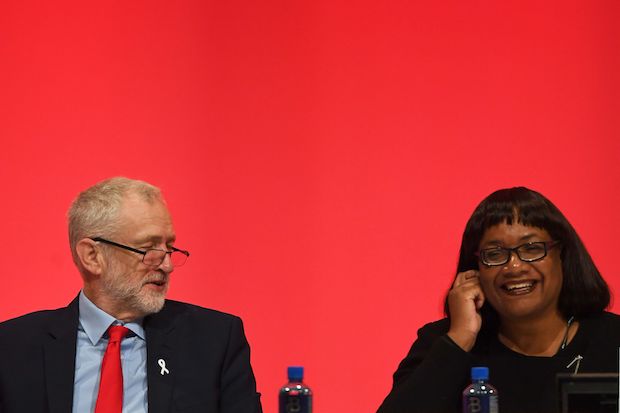Jeremy Corbyn was generous to the Shadow Cabinet in his conference speech, especially to Diane Abbott, who had a terrible election campaign personally, suffering from problems with her diabetes and horrendous racist and misogynist abuse. The Labour leader led a standing ovation to the Shadow Home Secretary, followed by a rendition of ‘happy birthday’.
He told the hall that ‘the campaign by the Tories and their loyal media was nasty and personal. It fuelled abuse online and no one was the target of that more than Diane Abbott.’
Let’s just recall the abuse of Diane Abbott during the election campaign. She said she had been called a ‘n***** bitch’, sent rape and death threats and received 45 per cent of all abusive tweets sent to female MPs during the election campaign. She made mistakes during the campaign, but even incompetence doesn’t merit abuse. Diane Abbott did not deserve the abuse she got. No-one deserves abuse, even if they are disagreeable.
Abbott clearly knows this, because she called on Labour supporters not to abuse Laura Kuenssberg after it emerged that the BBC’s political editor has been given a bodyguard so she can do her job safely at the Labour conference. Abbott said: ‘It is wrong. Laura is doing a job, I may not always like how she does the job every time, but it is her job and why – just because she is a woman journalist – does she get that level of abuse? It’s wrong.’
This articulates perfectly what a zero tolerance approach to abuse should look like. There is never any room for ‘well, she deserved it’, though that sentiment remains so prevalent in our culture. Rape victims are still blamed for wearing lingerie or drinking too heavily. Women whose husbands abuse them are suspected of having done something to provoke the ‘crime of passion’, including not having left their abuser. And journalists and politicians who either present critiques of parties or offer controversial policy ideas deserve to be abused. What do they all have in common? They’re women. For Abbott, the abuse seemed to be at its very worst because she wasn’t just a woman but a black woman. A double offence in the eyes of those who feel that certain groups shouldn’t have opinions or prominent jobs.
Those who really want to combat a culture of abuse of women need to be clear that it is as unacceptable to abuse your critics as it is your friends. If you don’t, then there is still a sense that people who you dislike somehow ‘deserve’ the abuse. Laura Kuenssberg no more deserves abuse than Diane Abbott, even though the Corbynites object noisily to the former and offer noisy support to the latter.
A standing ovation for a journalist at a party conference wouldn’t be a good thing at all – journalists need to be irritants rather than cheerleaders for political parties – but what would have been a better thing would have been if Corbyn had made very clear that his line ‘there can never be any excuse for the abuse of anybody’ applied to the people who make life difficult for the Labour Party (and, as it happens, the Tories) just as much as it applies to those who are in the Labour Party. It’s not enough to lump everyone into the general ‘anyone’ bracket. Corbyn and all other politicians need to be as explicit in challenging the abuse of their critics as they are in challenging the abuse of their friends.
Not condemning the abuse of apparently disagreeable people isn’t helpful to the agreeable people either. Abbott is well-liked in the hall and deserved her standing ovation. But outside the hall there are many people who think she deserves to be abused because they don’t like what she says or who she is. Inside the hall, there were doubtless some members who thought Kuenssberg deserved her abuse and threats because she had somehow been unfair to the Labour Party. Even if she had been unfair, she still wouldn’t have deserved the abuse.
This isn’t an act of whataboutery, whereby we try to undermine one problem by accusing those raising it of not addressing a different problem. The abuse of Abbott and Kuenssberg comes from the same source, which is a belief that certain people do not deserve to have opinions and high-profile jobs and instead deserve abuse and threats. To merely condemn the abuse of those we like is to ignore the root of that abuse. Abbott realises that, as do many of her female colleagues such as Jess Phillips and Harriet Harman. If the Labour leadership wants to see the vile abuse of its own frontbenchers diminished, then it needs to be explicit in condemning the people it feels less well-disposed to as well.







Comments